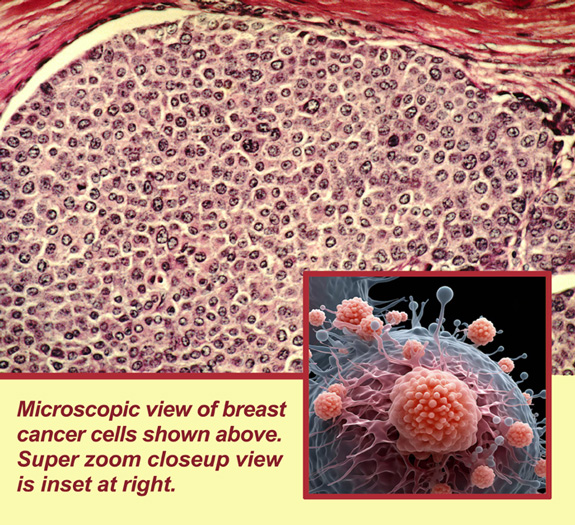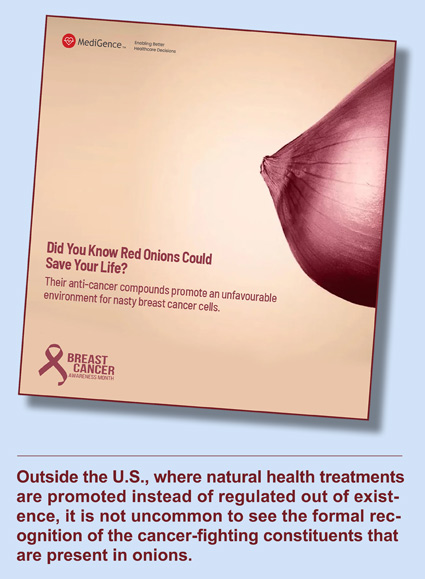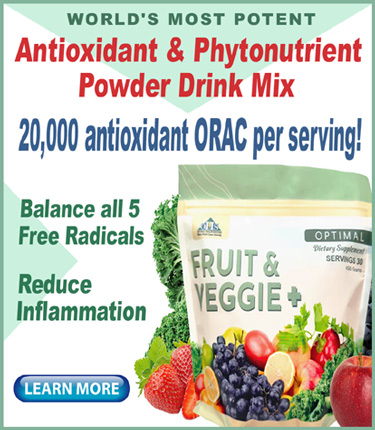When scanning the ingredients in your favorite nutritional supplement, you’re not likely surprised by the inclusion of exotic herbs from the Far East or Africa. The potent nutrients in plants found in remote places around the world are often featured in scientific journals.
But onion? Why would a basic vegetable like onion be included in a nutritional powder or capsule?
You might be surprised to learn that, when it comes to immune function and cancer prevention, the lowly onion just might be the most powerful ingredient in your supplement!
Background
Botanical and nutritional compounds have been used for the treatment of cancer throughout history.
Today it would be illegal, at least in the U.S., to make any claim on these foods “treating” cancer; however, scientists are interested to determine if the constituents in these traditional healing foods can be used to help “prevent” cancer.
The Allium genus includes garlic, onions, shallots, leeks, and chives. These vegetables are popular in cuisines worldwide and are also valued for their potential medicinal properties—at least outside the U.S.
Epidemiological studies, while limited in their abilities to assess precise Allium consumption, indicate some associations of Allium vegetable consumption with decreased risk of cancer, particularly cancers of the gastrointestinal tract.
Onion medicinal history
In ancient Egypt onions were not only a fortifying food, but were used as an aphrodisiac remedy. The Egyptians pharaohs even prohibited celibate priests from eating onions because of the potential effects on their libido.
It was Alexander the Great who carried onions from Egypt to Greece in the 4th century BC. The ancient Greeks believed that onions provided fortification against disease and improved sexual prowess and general strength; hence, onions were a regular part of the diet fed to the armies of Alexander the Great.
During both World War I and II, soldiers were given onions—and its close relative, garlic—to prevent gangrene. They were also used as an antiseptic and applied to wounds to prevent infection.
Even as late as 2009, many pharmaceutical-based Western countries were shocked to learn that Moldova’s military leaders were feeding the country’s soldiers onions and garlic to help them ward off swine flu.
According to the Defense Ministry’s chief doctor, general protection could be provided with the addition of only about 0.9 ounces of onions and 0.5 ounces of garlic to each soldier’s daily diet. That roughly corresponds to a small onion and a couple of garlic cloves.
What makes garlic and onions special?
Population studies from around the world suggest that a reduced risk of cancer is associated with high consumption of all kinds of vegetables and fruits. In fact, the research suggests the wider the variety, the better. So, what is it that makes onions and garlic so beneficial?
A 2017 study conducted at the University of Guelph in Ontario, Canada pinpoints the likely reason: Onions contain bountiful quantities of two specific flavonoids—quercetin and anthocyanin—that appear to work synergistically in combating cancer.
According to the study, published in Food Research International, all five of the onion types studied were effective at killing cancer cells—with red onions being particularly potent.
The researchers noted quercetin has already been shown to help treat heart disease, high cholesterol, diabetes, asthma, and a slew of other conditions.
But, when it comes to onions, the large concentrations of anthocyanin magnify the quercetin benefit. According to the researchers, the anthocyanin helps “boost the scavenging aspects of the quercetin molecules.”
To reach their conclusions, the research team placed colon cancer cells and quercetin extracted from the five different onion types in direct contact. Their observations clearly revealed the onions—especially red onions—were effective in destroying the cells.
“We found onions are excellent at killing cancer cells,” said Abdulmonem Murayyan, a PhD student at the university and the study’s lead author, in a press release. “Onions activate pathways that encourage cancer cells to undergo cell death. They promote an unfavorable environment for cancer cells and they disrupt communication between cancer cells, which inhibits growth.”
Related study
Another study, conducted in 2019 in Puerto Rico, found consumption of onions and garlic reduced breast cancer risk.
Researchers from the University of Buffalo in the U.S., working in tandem with researchers at the University of Puerto Rico, conducted a study building on the existing cancer research involving onion and garlic consumption.
Puerto Rico was of interest since the Puerto Rican female population experiences lower rates of breast cancer compared to the female population of the mainland United States. Researchers attributed the low rates to the Puerto Rican diet, which includes one of the world’s highest rate of onion and garlic consumption.
According to the study’s authors, Puerto Rican women who consumed higher rates of garlic and onions (more than once a day) had a 67% decrease in breast cancer risk compared to women consuming lower quantities.
The study is published in the scientific journal Nutrition and Cancer in August 2019.
– –
Onion is one of the powerful nutrients you’ll find in Optimal Fruit & Veggie Plus from Optimal Health Systems. Don’t worry about onion flavor, though—it’s hidden by the powerful berry taste from all the other high-antioxidant foods!
– –
Sources: Food Research International (2017 study), University of Guelph (press release), JustAPedia.org (genus Allium), Nutrition & Cancer (2019 study).



